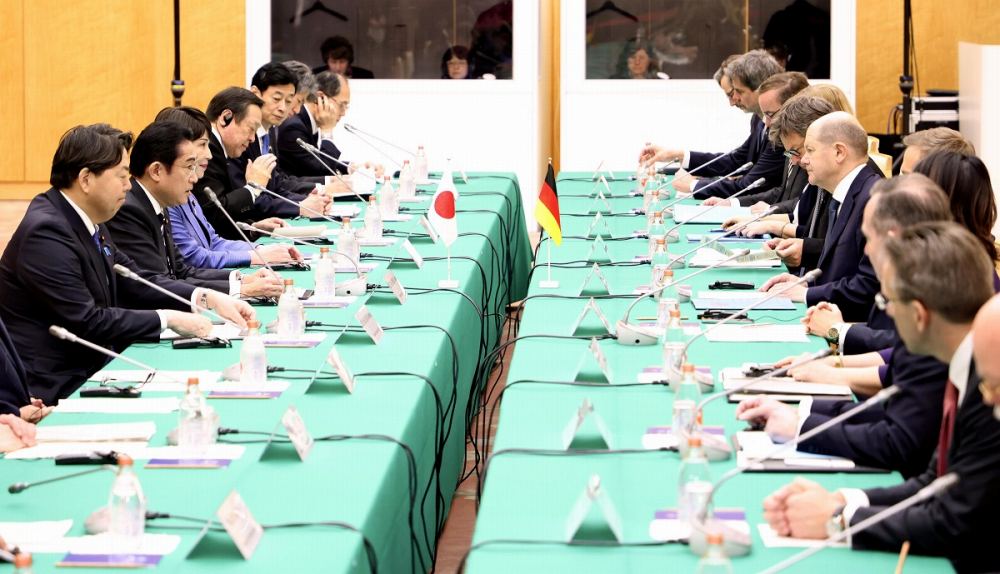
Prime Minister Fumio Kishida, second from left, and German Chancellor Olaf Scholz, opposite Kishida, are seen during intergovernmental consultations at the Prime Minister’s Office in Tokyo on Saturday.
17:55 JST, March 19, 2023
Prime Minister Fumio Kishida and German Chancellor Olaf Scholz reaffirmed their commitment to strengthen cooperation during the first Japan-Germany intergovernmental consultations held Saturday in Tokyo.
With China in mind, economic security was on the agenda for the meeting in which key cabinet ministers from Japan and Germany were in attendance.
As president of the G7 this year, Japan hopes to present a unified message regarding China at the May summit in Hiroshima by working closely with Germany, one of Europe’s leading powers.
Without mentioning China by name, Kishida referred to Beijing’s debt trap tactic of lending money to developing nations to gain the right to use ports and other facilities in the indebted country.
Japan and Germany “share concerns over development finance that lacks transparency and call on all actors to adhere to internationally recognized rules,” Kishida said in his opening remarks during the joint press conference with Scholz after the consultations.
Scholz also emphasized at the press conference that Japan and Germany “advocate the rules-based international order.”
The joint statement released clearly states, “Japan and Germany concurred on … tackling challenges to economic security under the G7.”
In preparation for the Hiroshima summit, Kishida visited G7 members France, Italy, the United Kingdom, Canada, and the United States in January, but did not visit Germany, the previous G7 president, as these intergovernmental consultations were upcoming.
The G7 summit is set to discuss economic security issues that were on the agenda of Saturday’s consultations.
“The talks were aimed at aligning policies toward China, particularly with regard to the economy,” a senior Foreign Ministry official said. “If Japan and Germany, which have deep economic ties to China, do not align over economic security, it will throw G7 unity into chaos.”
Following Russia’s invasion of Ukraine, Germany has strengthened its ties with Japan.
During the consultations, Berlin paid particular attention to the discussions on economic security across a wide range of policy areas, according to German government sources.
Germany is rushing to diversify its sources of energy and strategic goods, considering its overreliance on Russia for natural gas. It is also in the process of weaning itself off its dependence on China for the supply of item such as semiconductors. The sources added that the Scholz administration views as a model Japan’s efforts to reduce dependence on certain countries through supporting the production and stockpiling of semiconductors.
Top Articles in Politics
-

Japan PM Takaichi’s Cabinet Resigns en Masse
-

Sanae Takaichi Elected Prime Minister of Japan; Keeps All Cabinet Appointees from Previous Term
-

Japan’s Govt to Submit Road Map for Growth Strategy in March, PM Takaichi to Announce in Upcoming Policy Speech
-

LDP Wins Historic Landslide Victory
-

LDP Wins Landslide Victory, Secures Single-party Majority; Ruling Coalition with JIP Poised to Secure Over 300 seats (UPDATE 1)
JN ACCESS RANKING
-

Producer Behind Pop Group XG Arrested for Cocaine Possession
-

Japan PM Takaichi’s Cabinet Resigns en Masse
-

Japan Institute to Use Domestic Commercial Optical Lattice Clock to Set Japan Standard Time
-

Man Infected with Measles Reportedly Dined at Restaurant in Tokyo Station
-

Israeli Ambassador to Japan Speaks about Japan’s Role in the Reconstruction of Gaza





















